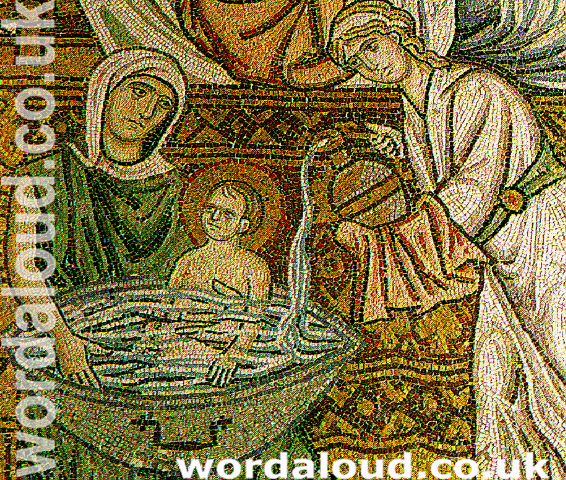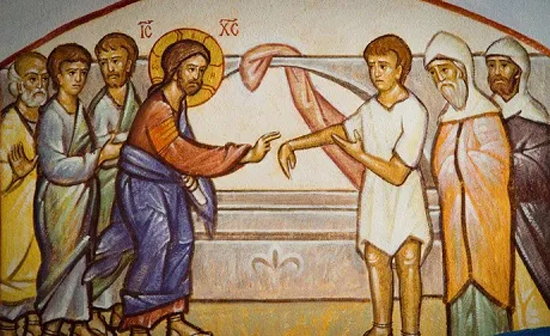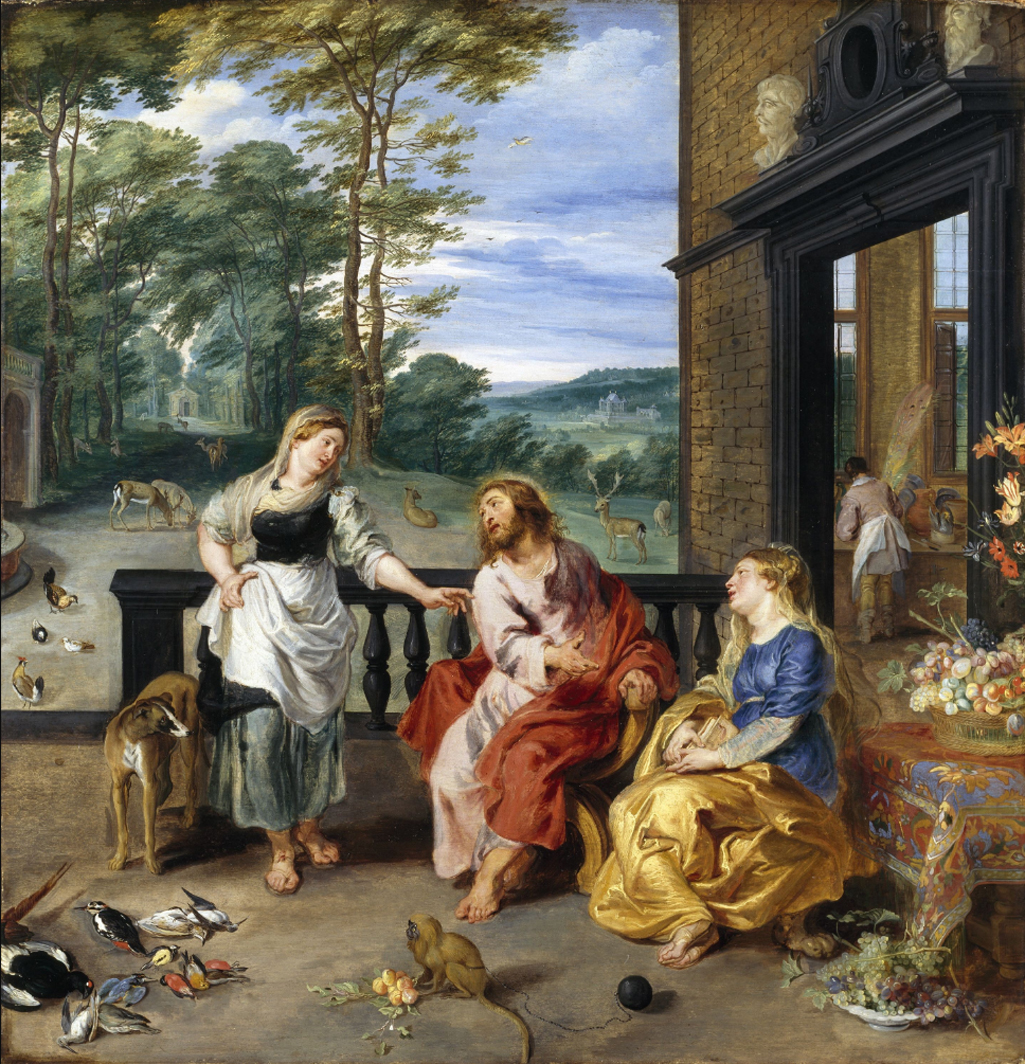Christian Art | Midwives Bathe The Infant Christ
Office Of Readings | Week 27, Tuesday, Ordinary Time | A Reading From The Letter Of Saint Ignatius Of Antioch To The Trallians | I Wish To Protect You In Good Time Because You Are Dear To My Heart
‘I wish to forewarn you, for you are my dearest children.’
In his Letter to the Trallians, Saint Ignatius of Antioch offers both affection and warning to a Christian community he deeply admires. Writing on his journey to Rome, where he would face martyrdom around the year 107, Ignatius uses his correspondence to affirm unity, humility, and fidelity to the structure of the Church. His tone is that of a spiritual father who encourages steadfastness in faith while defending the young Church against division and false teaching.
Ignatius begins by identifying himself as Theophorus, meaning ‘God-bearer’, a title that captures his conviction that the Christian carries within himself the presence of Jesus Christ. He writes to the Church in Tralles, a city in Asia Minor, commending them for their endurance, patience, and faith. These virtues, he notes, are not merely achievements but gifts from God, evidence that grace is already at work in them. His praise reflects a pastoral approach: affirmation of faith precedes correction or caution.
A central theme is ecclesial unity, expressed through obedience to the bishop, presbyters, and deacons. Ignatius presents this structure not as a human institution but as a reflection of divine order. The bishop represents the image of the Father, the presbyters correspond to the apostles, and the deacons serve as ministers of the mysteries of Christ. Together, these three orders constitute the visible expression of the Church’s unity and fidelity. For Ignatius, to separate from the bishop is to separate from Christ himself, for it is through this communion that believers remain within the sanctuary, within the sphere of divine grace and truth.
This emphasis on unity was not abstract. In the early second century, Christian communities faced significant internal pressures: differing interpretations of doctrine, local rivalries, and emerging forms of heresy that questioned the reality of Christ’s incarnation and passion. Ignatius insists that the life of the Church depends on remaining in Christ, which is to say, remaining within the body that confesses Christ’s true humanity and divinity. The call to ‘abstain from the alien food that is heresy’ is an image of spiritual nourishment. True faith feeds the soul, while false teaching weakens it, leading to separation from the life of God.
The tone of Ignatius’s writing is both paternal and ascetic. His words to the Trallians are charged with personal humility and the awareness of his impending martyrdom. Though he acknowledges a ‘fierce desire to suffer’, he confesses uncertainty about his worthiness for such a death. In this we see a profound humility: martyrdom is not a glory to be claimed but a grace to be received. For Ignatius, humility is not weakness; it is the weapon by which ‘the prince of this world is overthrown’. The bishop who is soon to die for Christ sees in humility the same power that triumphed on the Cross.
His warning to the Trallians, ’I only wish to forewarn you, for you are my dearest children,’ is therefore not born of fear but of love. It reflects a theology of communion grounded in obedience and truth. To act apart from the bishop and clergy is to act apart from the body; to remain in communion is to remain in Christ. Ignatius’s vision of the Church is one of organic wholeness, sustained by love and ordered by faith.

A Reading From The Letter Of Saint Ignatius Of Antioch To The Trallians | I Wish To Protect You In Good Time Because You Are Dear To My Heart
Ignatius, also called Theophorus, to the holy church at Tralles in the province of Asia, dear to God the Father of Jesus Christ, elect and worthy of God, enjoying peace in body and in the Spirit through the passion of Jesus Christ, who is our hope through our resurrection when we rise to him. In the manner of the apostles, I too send greetings to you with the fullness of grace and extend my every best wish.
Reports of your splendid character have reached me: how you are beyond reproach and ever unshaken in your patient endurance–qualities that you have not acquired but are yours by nature. My informant was your own bishop Polybius, who by the will of God and Jesus Christ visited me here in Smyrna. He so fully entered into my joy at being in chains for Christ that I came to see your whole community embodied in him. Moreover, when I learned from him of your God-given kindliness toward me, I broke out in words of praise for God. It is on him, I discovered, that you pattern your lives.
Your submission to your bishop, who is in the place of Jesus Christ, shows me that you are not living as men usually do but in the manner of Jesus himself, who died for us that you might escape death by belief in his death. Thus one thing is necessary, and you already observe it, that you do nothing without your bishop; indeed, be subject to the clergy as well, seeing in them the apostles of Jesus Christ our hope, for if we live in him we shall be found in him.
Deacons, too, who are ministers of the mysteries of Jesus should in all things be pleasing to all men. For they are not mere servants with food and drink, but emissaries of God’s Church; hence they should guard themselves against anything deserving reproach as they would against fire.
Similarly, all should respect the deacons as Jesus Christ, just as all should regard the bishop as the image of the Father, and the clergy as God’s senate and the college of the apostles. Without these three orders you cannot begin to speak of a church. I am confident that you share my feelings in this matter, for I have had an example of your love in the person of your bishop who is with me now. His whole bearing is a great lesson, and his very gentleness wields a mighty influence.
By God’s grace there are many things I understand, but I keep well within my limitations for fear that boasting should be my undoing. At the moment, then, I must be more apprehensive than ever and pay no attention at all to those who flatter me; their praise is as a scourge. For though I have a fierce desire to suffer martyrdom, I know not whether I am worthy of it. Most people are unaware of my passionate longing, but it assails me with increasing intensity. My present need, then, is for that humility by which the prince of this world is overthrown.
And so I strongly urge you, not I so much as the love of Jesus Christ, to be nourished exclusively on Christian fare, abstaining from the alien food that is heresy. And this you will do if you are neither arrogant nor cut off from God, from Jesus Christ, and from the bishop and the teachings of the apostles. Whoever is within the sanctuary is pure; but whoever is not is unclean. That is to say, whoever acts apart from the bishop and the clergy and the deacons is not pure in his conscience. In writing this, it is not that I am aware of anything of the sort among you; I only wish to forewarn you, for you are my dearest children.
Christian Prayer With Jesus
Lord Jesus Christ,
you are the shepherd and guardian of our souls.
Grant us grace to live in unity with one another,
to honour the ministries you have established,
and to remain steadfast in the truth of your Gospel.
Strengthen us with humility and faith,
that we may bear your presence within us,
and be nourished by the food of your Word and Sacrament.
Keep us from all division and error,
and make us one body in you,
who live and reign with the Father and the Holy Spirit,
one God, now and for ever.
Amen.
Glossary Of Christian Terms
Saint Ignatius of Antioch (c. 35–107) – Early Christian bishop and martyr, one of the Apostolic Fathers. He wrote seven letters to Christian communities while on his way to Rome for execution, offering some of the earliest reflections on Church order, unity, and the meaning of martyrdom.
Theophorus – A title meaning ‘God-bearer,’ used by Ignatius to express the idea that the Christian carries the presence of Christ within.
Tralles – A city in Asia Minor (modern-day Aydın, Turkey), home to one of the Christian communities addressed by Ignatius.
Bishop, presbyters, deacons – The threefold structure of Church ministry. Ignatius presents these as divinely instituted offices reflecting the unity of the Father, Son, and Holy Spirit.
Martyrdom – The act of bearing witness to Christ through the surrender of one’s life. For Ignatius, martyrdom is participation in the passion of Christ, a means of complete union with him.
Heresy – False teaching that distorts or denies central truths of the Christian faith. Ignatius frequently warns against doctrines that deny Christ’s real humanity or divide the Church.
Sanctuary – In Ignatius’s usage, the realm of holiness and communion where God’s presence dwells. To remain within the sanctuary is to remain within the unity of the Church and the truth of Christ.
Communion – Spiritual unity among believers through faith, sacraments, and obedience to legitimate authority; participation in the life of Christ’s Body, the Church.








